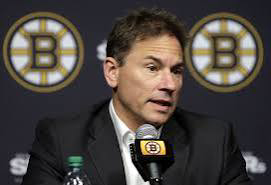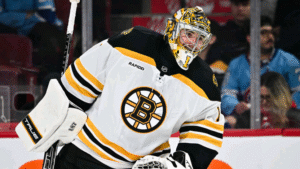
1. Whether David Pastrnak has enough support,
2. If new head coach Marco Sturm can bring back the team’s old identity, and
3. Whether goaltender Jeremy Swayman can return to form.
1. Is There Enough Talent Around David Pastrnak to Drive the Bruins Offense?
David Pastrnak was once again an elite performer in the NHL last season, showing why he’s considered one of the most dynamic offensive players in the league. Finishing with an outstanding 106 points, comprised of 43 goals and 63 assists, Pastrnak tied with Edmonton Oilers star Leon Draisaitl for third place in the league scoring chart. Only Nikita Kucherov of the Tampa Bay Lightning (121 points) and Colorado Avalanche forward Nathan MacKinnon (116 points) outscored him.

Yet despite Pastrnak’s remarkable individual success, the Boston Bruins found themselves struggling in the scoring department. The disparity between Pastrnak and the rest of the roster was alarming. Morgan Geekie, who ranked second in scoring for Boston, ended the season with 57 points — a solid number, but still 49 fewer than Pastrnak. Between the two of them, they accounted for 76 of the team’s 222 total goals, equating to more than a third (34%) of the team’s entire offensive output.
The Bruins’ limited firepower became even more glaring when compared with some of the league’s deeper offensive rosters, especially in high-stakes matchups. That has raised pressing questions heading into the new season: Can Boston realistically expect to compete for a championship if the offensive burden continues to rest so heavily on Pastrnak’s shoulders?
During the offseason, General Manager Don Sweeney made moves to try and reinvigorate the team’s attack. One of the most notable acquisitions was Viktor Arvidsson, a forward who contributed 27 points (15 goals, 12 assists) over 67 games for the Edmonton Oilers last season. He was acquired for a relatively low price — a fifth-round pick in the 2027 NHL Draft — suggesting the Bruins see untapped value in him. However, Arvidsson’s numbers pale in comparison to top-line forwards, and expectations should be tempered accordingly.
Rather than chasing big-name free agents or blockbuster trades, Sweeney has emphasized internal improvement and player development as the team’s primary strategy. “We were going to put together a competitive team to bring in some juice back in here,” Sweeney explained. He stressed that much of the improvement must come from the players already in the organization — players who may be coming off subpar or injury-riddled seasons and are eager for a fresh start.
The hope is that Boston’s returning core can shake off the rust and elevate their games. Sweeney added, “That applies to elevating our current guys, them feeling reinvigorated… Just the response to that, having those guys, and realizing just how excited some of these guys are to get here.”
It’s a bold gamble that the energy will come from within, from the locker room up. The team is banking on a resurgence led by a reinvigorated group of veterans, young breakout candidates, and better health across the board. But until those gains materialize, questions about offensive depth will linger. Pastrnak remains the heartbeat of the Bruins’ attack — the concern is whether there’s enough offensive muscle around him to make a deep playoff run.
—
2. Can Marco Sturm Reinstate the “Bruins Way” and Fix the Defense?
It wasn’t just the offense that let the Bruins down last season. Their defensive structure, once a staple of the team’s identity, collapsed in alarming fashion. Boston ended the season ranked 26th in the league in goals allowed per game, surrendering an average of 3.30 goals. That’s a sharp decline from the year before, when they were among the NHL’s defensive elite, allowing only 2.70 goals per game — good for a tie with the Vancouver Canucks as the fifth-best defensive team in the league.
General Manager Don Sweeney didn’t hold back in assessing the team’s issues on the defensive side of the puck, admitting the Bruins were often seen as an “easy out” by opponents. Whether due to inconsistent defensive pairings, tactical lapses, or simply a lack of cohesion, Boston’s defensive issues were too significant to ignore.
To address this critical issue, the Bruins hired Marco Sturm as their new head coach on June 5, replacing interim bench boss Joe Sacco. Sturm is no stranger to the franchise, having played for Boston from 2005 to 2010. He brings with him a deep understanding of the culture and expectations that define Bruins hockey.
Sturm’s return is not just a sentimental decision. It’s a calculated move aimed at restoring the discipline, structure, and defensive identity that once defined the organization. From the outset, Sturm has shown a willingness to engage directly with his players, especially the team’s veterans, to assess where things went wrong and how to course-correct moving forward.
“I already talked to a bunch of guys, my veterans on the current team right now,” Sturm shared. “And I can tell right away they learn from Bergeron, they learn from Chara.” He’s referring to former captain Patrice Bergeron and longtime defensive anchor Zdeno Chara, two players who embodied the Bruins’ hard-nosed, team-first mentality. “They already have it in there,” Sturm added, “and that really got me excited, too. And I know we’ve just got to guide them again and again.”
Sturm understands that cultural change doesn’t happen overnight. It’s a matter of nurturing the good habits already embedded in the locker room and reinforcing the core values of accountability, work ethic, and discipline.
One of the key themes of Sturm’s early tenure has been rediscovery — finding and reviving the hard-edged identity that has long characterized Bruins teams. He believes the blueprint for success is already within the team. Now it’s about translating that foundation into consistent play on the ice.
If Sturm succeeds in tightening up the defense and re-establishing the “Bruins way,” Boston could become a much more difficult team to play against — the kind of team that grinds out wins and frustrates opponents. But that transformation will take time, patience, and a firm commitment from the entire roster.
—
3. Will Jeremy Swayman Regain His All-Star Form in Net?
The struggles on defense extended to the goaltending position, where Jeremy Swayman endured the worst season of his NHL career. Now entering his sixth year in the league, Swayman posted a record of 22 wins, 29 losses, and 7 overtime/shootout losses. His goals-against average ballooned to 3.11, and his save percentage plummeted to .892 — both of which were the lowest marks of his professional career.
It was a sobering regression from the previous season, when Swayman earned an NHL All-Star selection and finished with a 2.53 GAA and .916 save percentage over 44 starts. In 2023-24, he was a key reason why Boston remained competitive, even when the offense faltered.
However, things took a turn before the most recent season even began. Swayman missed training camp due to a prolonged contract negotiation, eventually signing a lucrative eight-year, $66 million extension on October 6, carrying an average annual value of $8.25 million. By the time the season started, he had already fallen behind in preparation.
That lack of preseason work may have contributed to his uneven performance throughout the year. Swayman was relied upon more than ever before, appearing in 58 games — a career high — yet struggled under the weight of that increased responsibility. During his final 11 starts of the season, he recorded just two wins (2-8-1) and surrendered four or more goals in seven of those games.
Despite the downturn, Swayman remains optimistic about his future and eager to bounce back. “I can play better,” he said after the season ended. “That’s something that I can’t wait to work on.” His comments reflect a clear desire to learn from his setbacks and build on them heading into the next campaign.
Swayman also believes the entire team can benefit from the adversity they faced. “This team is going to be a lot different next year with what we learned from this year,” he noted. “We’ve got a lot to look forward to.”
The Bruins are betting big on Swayman returning to his All-Star level. With a hefty contract in place and no clear successor waiting in the wings, Swayman is entrenched as the team’s franchise goaltender. But for Boston to contend, they’ll need him to be sharp from day one — consistent, confident, and capable of stealing games when needed.
If he’s able to rediscover the form that made him a star just one season ago, the Bruins’ outlook would improve significantly. But if he falters again, the team could find itself scrambling to find stability between the pipes — a position that has long been one of Boston’s strengths.
—
Final Thoughts: A Team at a Crossroads
The Boston Bruins are heading into the new NHL season with plenty of talent but just as many question marks. Can the supporting cast around David Pastrnak provide enough offense to keep up with the league’s elite teams? Will Marco Sturm’s return to the organization help re-establish the defensive identity that made Boston a perennial contender? And can Jeremy Swayman shake off a down year and reassert himself as one of the league’s premier goaltenders?
The answers to those questions could define not just the Bruins’ season, but the trajectory of the franchise in the years to come. One thing is clear: Boston isn’t content with mediocrity. With familiar faces returning and new leadership at the helm, they’re determined to find their way back to relevance.
But the road won’t be easy. The Eastern Conference remains fiercely competitive, and internal improvement, while promising, can only take a team so far. For the Bruins to once again be taken seriously as Stanley Cup contenders, everything — from their best players to their role players, and from their new coach to their established goaltender — will need to click.
As the puck drops on a new season, the Bruins find themselves at a pivotal moment. The answers will come not in words, but in results on the ice.
Leave a Reply